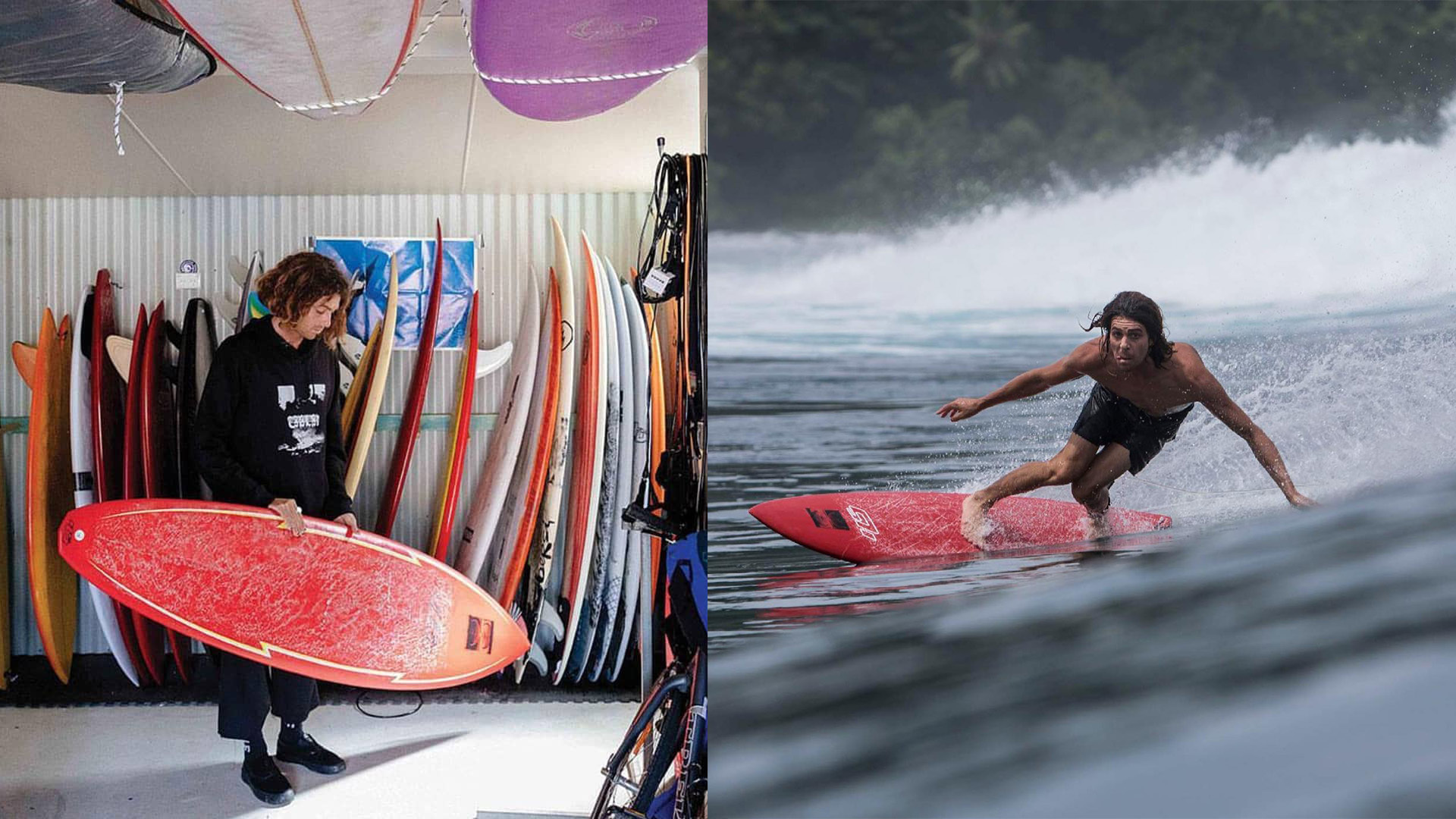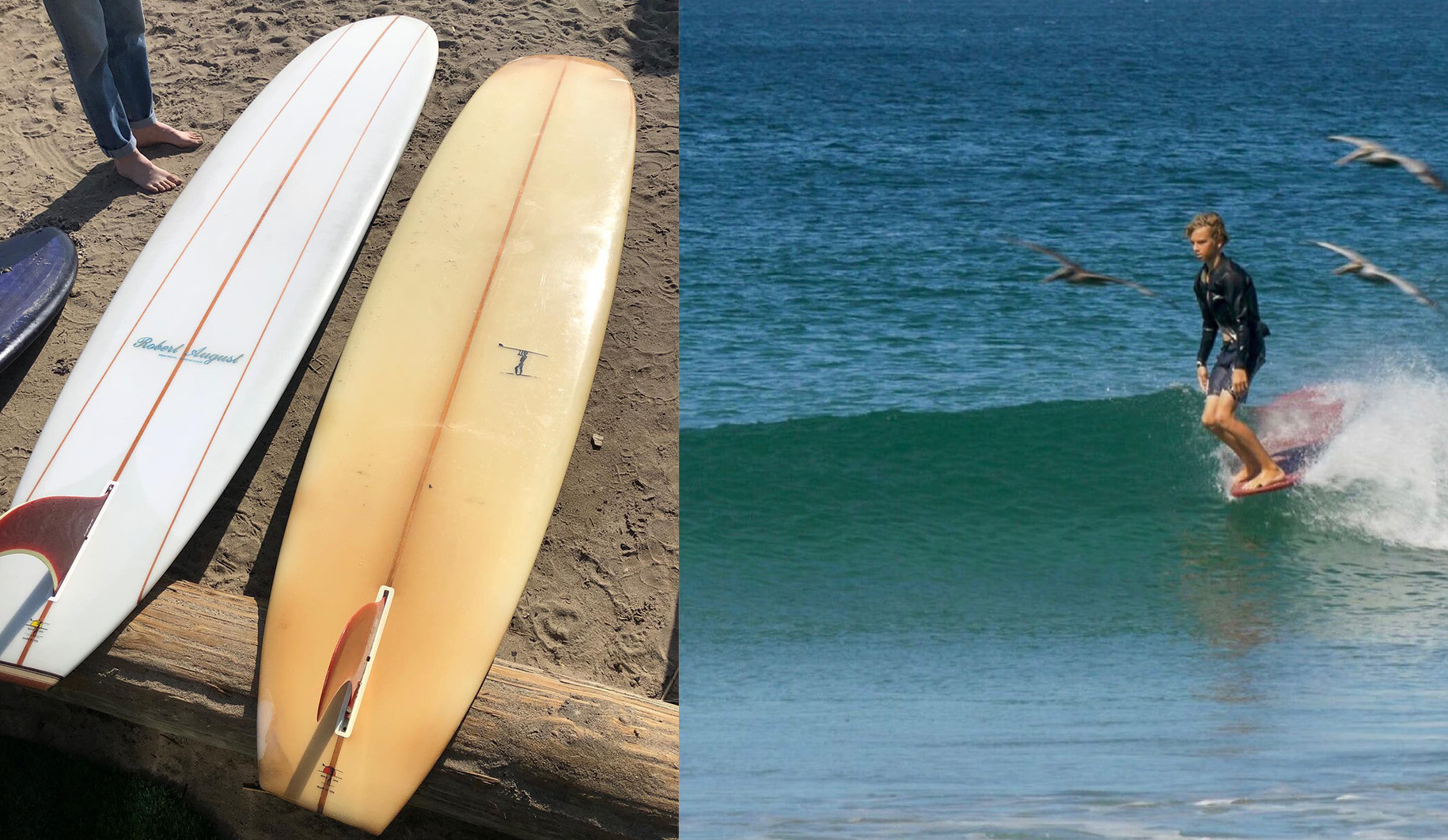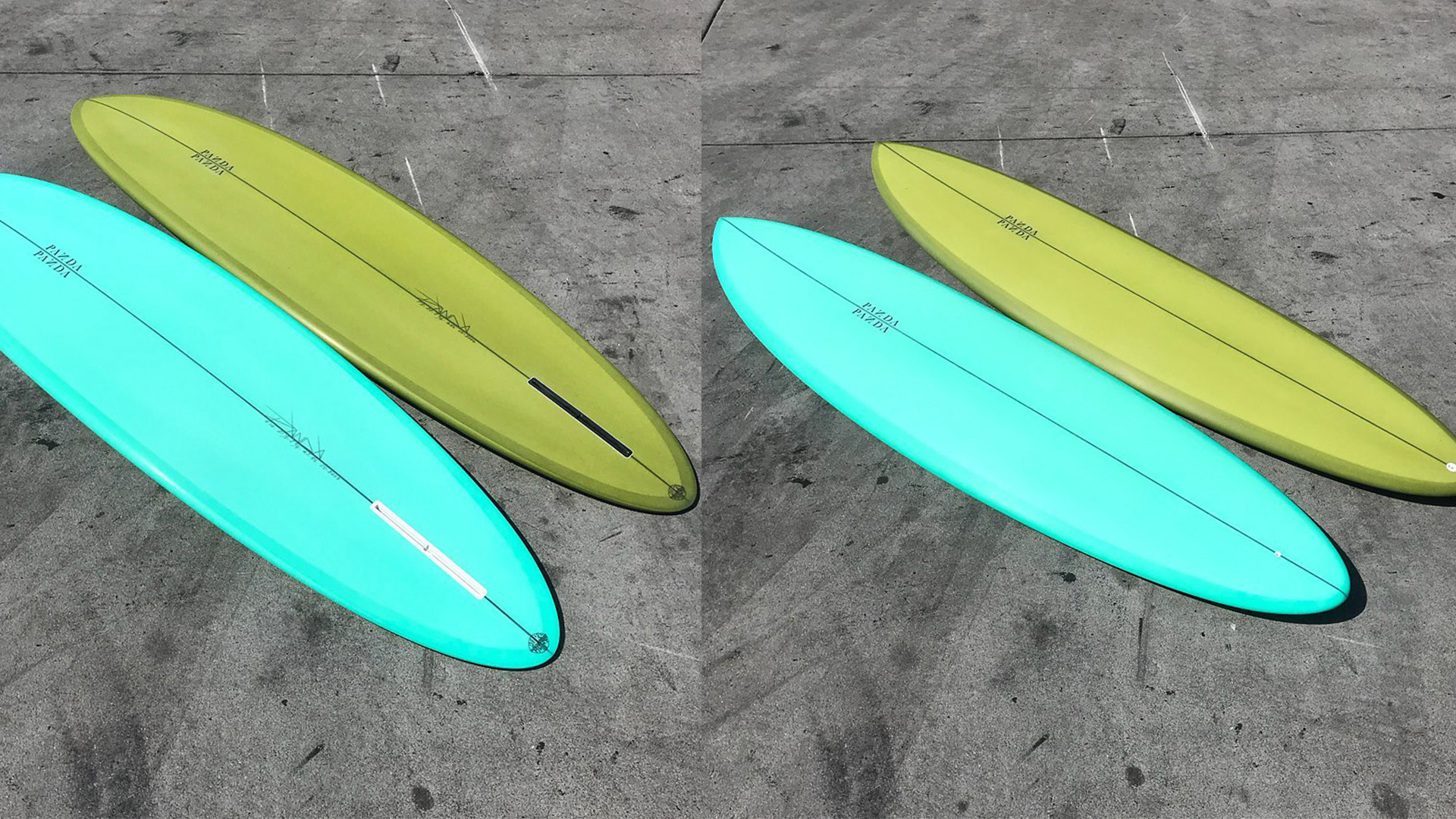Ultimate Guide to Single Fin Surfboards
Surfing is an art form, and a single fin surfboard draws some seriously artistic lines.
A single fin board promotes a slower, more mellow approach to surfing that is suitable and enjoyable for any surfer, a way to appreciate the soul of our sport. So if you've been curious about this type of fin set-up, how these boards feel under your feet, and why a single fin is synonymous with style, keep reading to learn more about this special type of board and where it belongs in your quiver!
 From below Craig Anderson on a Haydenshapes Cannon.
From below Craig Anderson on a Haydenshapes Cannon.
What is a Single Fin Surfboard?
A single fin surfboard is a term used to describe any surfboard that is ridden with just one large fin, a.k.a. the 'single fin'.
This term is extremely broad, as the shapes and sizes of single fin boards will vary greatly. For example, there exist single fin shortboards, single fin longboards, and single fin fun shapes, all with entirely varying dimensions and outlines.
The key to this type of surfboard lies directly in the single fin set-up, as a surfboard is not a single fin board if it features anything more than one fin.
When asking "what is a single fin surfboard?", note that the answer is more of a way to describe a type of fin set up than it is the type of surfboard itself.
With that being said, surfboards that are meant to be ridden as a single fin will be shaped to cater to the performance characteristics of these types of boards- you can't just take two fins off of your performance thruster and call it a day, thinking that it will ride well.
Single fin boards are synonymous with longer, more drawn-out carves and cutbacks, and less about aggressive hacks on the lips. So regardless if your single fin board is a shortboard or a longboard, it will most likely come shaped with a little more volume and with increased lengths, widths, and thicknesses (compared to performance shortboard/longboard counterparts) to complement the old-school feel of this type of fin.
A single fin, especially the classics, is sometimes glassed into the surfboard. Others might come with a fin box that allows you to choose and ride different types of single fins depending on the conditions at hand and your preferred riding style.
 Craig Anderson and 7'0 Haydenshapes Cannon.
Craig Anderson and 7'0 Haydenshapes Cannon.
Single Fin Surfboard Characteristics and Conditions
The truth is that the ideal conditions for your single fin depend on the particular shape and size of your surfboard, as a single fin longboard will showcase a very different feel and characteristics than a single fin shortboard.
We'll get into the specifics of each, but for both of these single fin surfboard types, a few things will always remain true:
One fin reduces drag.
Three to four fins placed in different fin boxes will increase the drag of the surfboard, so a single fin surfboard will showcase less drag than thruster/quad counterparts. Less drag helps promote speed down the line and is better for longer, more drawn-out turns.
Increased turning radius
The fins of a thruster or a quad act as varying pivot points to direct your turns and allow for much sharper, quicker, and more aggressive hits on the lip.
A single fin is one pivot point, and this pivot point extends way further into the water, as single finds are much longer than standard performance fins. This single fin increases the available turning radius of the surfboard, and makes these performance maneuvers more challenging to do.
Just as less drag accommodates longer, smoother carves on the shoulder and less aggressive hacks, so does the increased turning radius of a single fin board.
Trimming Not Pumping
Regardless of your single fin surfboard type, you will utilize trimming as a means to generate speed and small directional changes far more than pumping. Pumping is reserved for performance-oriented surfboards.
Increased Dimensions
Single fins take a lot more time and planning to direct your turns and to navigate your line.
They do not have the immediate response time of performance surfboards, and this forces a much more casual and relaxed approach at initiating bottom turns and other carves. Adjustments on the face take longer, as well, and locking into the pocket early is essential.
Because of this, a single fin surfboard will feature increased dimensions. These dimensions all promote the volume, and therefore the buoyancy, of the surfboard. Greater volume allows the surfer to paddle into and drop into the wave much earlier, before it pitches and becomes too steep. Therefore, it is the most important aspect of setting up your direction down the line.
Increased Hold
Although single fins work exceptionally well in smaller, weaker conditions due to their buoyancy and effortless ability to paddle into mushier waves, a large single fin will also promote hold in big, powerful conditions.
The length of the single fin makes it protrude deeper into the wave face, and this will create a sense of stability (once you get the hang of it) that helps prevent an unwanted spinout when in the barrel.
Single Fin Longboards
The placement and size of a longboard single fin make them ideal for smaller, weaker, and chunkier conditions, and are the perfect old-school surfboards for mellow drop-knee cutbacks and noserides.
Depending on the longboard, you can indeed surf bigger, head-high+ conditions, as long as they aren't spitting barrels and steep faces.
A single fin longboard will require the surfer to really learn how to master trimming and the use of their rails to initiate carves, and the single fin acts as a point to press your weight down to control more defined board movements.
These surfboards take experience in learning how to drop early into a wave so that you can draw your line, but once you get the hang of it, you'll never feel as floaty and as free as you will flying down a mellow line.
To summarize, a single fin longboard is perfect for:
- Experienced surfers who love a classic take on surfing and spending time on the nose
- Shortboarders who still want to ride something when the waves get small
- Beginner surfers mastering their pop-up and riding straight with the whitewash.
And may not be the right choice if you:
- Prefer a performance longboard (a single fin with side bytes promotes performance)
- Only ride steep waves
- Prefer in the pocket, aggressive surfing
- Don't care about style and hanging 10
If you want a single fin board made for noseriding, look no further than the Forman by Null Surfboards or the Stamps by Axis for a modern take on classic board outlines.
For a little touch of performance but still single fin vibes, you might enjoy the Noll by Enduro or the Helix by Noll Surfboards. With the ability to add side bytes to the single fin, you can easily pump up the performance of these otherwise classic noseriding shapes.
And if you simply want to have a board that you can turn on small days, you will surely enjoy the easy wave catching and carving ability of the mid-length Mid Ranger by Panda.
 Old and new Robert August classic logs and to the left Tommy August hanging 10.
Old and new Robert August classic logs and to the left Tommy August hanging 10.
Single Fin Shortboards and Mid-Lengths
Just because a surfboard is a single fin surfboard doesn't mean you can't control it and whip it around a bit. It just takes practice, the right waves, and an understanding of board control with this type of fin setup.
Remember, a single fin shortboard or mid-length will be much thicker, wider, and a little bit longer. This means that not only can you catch and ride gutless, mushy, and weak thigh-high waves, but you can also cruise into larger and steeper sections as well.
This makes this type of single fin outline an excellent choice in providing a surfboard that embodies versatility, one that you can seemingly ride no matter what mother nature throws your way.
You will love the way that these surfboards feel under your feet if you:
- Appreciate style
- Enjoy mellow, drawn-out carves more so than off the lip maneuvers
- Like setting your lines early
- Desire hold and stability in barreling conditions
- Love riding small, weak waves
- Prefer a mixture of performance with easy paddling and rideability
And you just might want to go for something a little more performance-oriented if you:
- Enjoy a quick, aggressive response
- Love snapping off the lip
- Perform aerial maneuvers
- Only ride bigger waves
- Seek progressive ability out of your surfboard
- Take late drops for deep barrels
We have a ton of single fin surfboards available, but as always, there are a few that shine bright in the sea of surfboards.
For a single fin that you can paddle out nearly any day, peek the Single Fin by Gary Mcneill or the Voyager by Noll. These shapes are the culmination of a classic surfboard shape matched with modern performance, taking you from knee-high to overhead with ease.
If you are looking for serious performance out of a single fin and for a single fin surfboard that does well in steeper, barreling conditions, look no further than the El Dub by Noll for early drop-ins (due to the wide nose) and control (due to the pulled in tail) in the tube.
If you seek a small wave machine, a board that you can have fun implementing a stylish approach to mellow conditions, then check out the mid-length Parabolic Egg with optional side bytes.
And for the performance guys and gals who want a shortboard-like feel matched with a touch of old-school flair, we have ya covered.
The Cannon by Haydenshapes is absolutely insane, one of the most innovative twists on performance-oriented single fins, as is their Plunder. The Plunder features a single fin with the option for a quad fin set up and is the best surfboard you can choose if you want to avoid a longboard at all costs yet still rip up small waves.
 The Mid-Ranger by Panda
The Mid-Ranger by Panda
Single Fins- The Fin
Remember, a single fin is all about the fin, so as well as our collection of single fin surfboards, also browse our collection of single fins for unique versions of this fin type.
Where some fins spell performance, others spell out hold. The best single fin surfboard will always be specific to your surfing abilities, your style, and the conditions at hand, so make sure to adjust the fin choice accordingly based on these preferences.
Single Fins- The Summary
It's simple- single fins are fun, classic, and easy to ride. They bring you back to the roots of surfing and force you to focus on the fundamentals, both in terms of why we love surfing and also the fundamentals of basic maneuvers.
The best surfers experiment with all types of surfboard shapes, and a single fin surfboard should never go overlooked in your pursuit to become a better surfer. You can always rely on your single fin, as they are excellent choices for a wide range of conditions, and hell, no one ever complains about catching more waves, right?!
For a wave catching, noseriding, carving, and cutbacking board that is a mixture of modern performance and classic surfing, look no further than a single fin surfboard.
Watch Craig Anderson below on on the Haydenshapes Glider.
Finally, venture into the world of surfboard versatility with our incredible range of fin surfboards. While single fin surfboards are a must-try, don't miss out on the exhilarating experience of exploring various fin setups that can completely transform your ride. Discover the perfect fin combination to unlock new dimensions of performance and style in your surfing journey.








